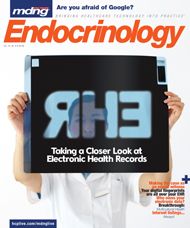4 Questions... with Louise B. Andrew, MD, JD
Louise B. Andrew is a fifth-generation physician who has made a career of serving health professionals in distress after her own experience dealing with a medical malpractice suit.
Louise B. Andrew is a fifth-generation physician who has made a career of serving health professionals in distress after her own experience dealing with a medical malpractice suit. Dr. Andrew trained at Duke and Johns Hopkins and is a former faculty member of Internal Medicine and Emergency Medicine at Johns Hopkins University School of Medicine. Andrew off ers insight and advice regarding litigation issues.
I offer a form of coaching, or even therapy, by phone, or in person. My special skill is helping doctors deal with parts of the law that are unfamiliar and frightening to them. Physicians facing lawsuits often make mistakes before they access their own legal representation, such as meeting with the patient or patient’s family and trying to work things out. This is a noble goal, but it has to be done in a particular way to be done safely. The worst mistake is when they go back and alter medical records to cover their tracks, which can automatically forfeit their case. Even when doctors access their legal representation, they often don’t get the emotional support they need, because lawyers are trained to deal with the legal and technical aspects of the case, not the emotional and personal aspects. I help physicians learn how to play the game—how to keep their practices, family, and lives together while they go through this incredibly stressful process.
2 What issues do you deal with when you are coaching physicians? I discuss how to handle the touchy parts of your personal practice; for example, seeing the plaintiff patient or members of their family in the future, or determining what can be safely explained to other patients if the case has been publicized. We also talk about how to handle subsequent patients, while at the same time dealing with the fear that the next one might be the next person who sues you. I also go beyond that type of practical advice, because physicians who are being sued take it to heart; many doctors who are not prepared for the possibility of being sued are devastated by it. I teach how to manage your time during litigation and how to include and enlarge your circle of support in a safe way.
3 How did you end up in this line of work? I was on the faculty of Johns Hopkins, and during my first 10 years of practice, I was sued by virtue of a legal technicality involving a patient a resident had seen. The resident had done nothing wrong. So I said to myself, “You know, there’s something wrong here.” Somebody needs to teach doctors how to handle and interact with the legal system, because it’s clearly a risk not to know how that system works before you get caught in it.
4 What advice do you have for physicians facing litigation? My principal advice, which is different from what every risk manager will tell physicians, is that you need to share the experience with somebody. Legally speaking, if you go out and talk about the case to someone who’s not involved, unless they’re in a certain “privileged” category, they may subsequently be deposed in the case, and anything you may have said to him or her can be used against you in the case. So risk managers and most lawyers say “don’t talk to anybody.” That’s extremely damaging, because human beings under stress need to speak with somebody or they’re going to react poorly. There are privileged classes of people under the law that you can and should talk to. Your lawyer, your spouse, a counselor such as a priest, rabbi, or a minister, physician, psychologist, or sociologist who is working with you in a professional capacity, would be in a protected category. You can say what you need to that type of an individual without fear that they would be called into the case. That’s even including details of the case, anonymously of course. With anyone, it’s safe to describe the emotions that you’re feeling. That’s a really important thing for human beings in order to process and resolve those emotions. This advice might seem at variance a bit with what physicians hear repeatedly from risk managers and lawyers, but it is actually very consistent with the law.
